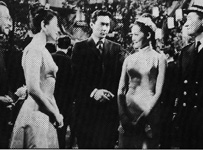|
GOLDSEA |
ASIAMS.NET |
ASIAN AMERICAN PERSONALITIES
THE 130 MOST INSPIRING ASIAN AMERICANS
OF ALL TIME
LEADING MAN EMERITUS
PAGE 2 OF 4
Q: How did the transition go from singing to acting?
A: I was appearing in Las Vegas and Vegas as you know, attracts many people. I don't know the process in which it came about, but I was asked by Paramount and James Clavell to appear in a movie -- Walk Like a Dragbon with Jack Lord and Nobu McCarthy. During some of the shooting, I commuted via ambulance after my last show in Vegas because the ambulance was the only way I could be driven to the studio on time and I could sleep on the way.
Q: How did you find the experience of suddenly getting into the movies?
A: It was very exciting. The producer of Flower Drum Song, Ross Hunter, approached me and asked if I would do the film version. If someone asks me, "What the formula, how do you break into film, show business (however you want to put), that element of luck is 60-75 percent of it.
Q: So success came easy for you then?
A: I wouldn't say easy. I worked very hard to get into the singing aspect of it. But as far as the films were concerned, I guess it was a natural evolution up to a point. Vegas was like a showcase where thousands upon thousands came to see the show. In that respect it was a good showcase for me.
Q: Were were you headlining?
A: Yes. In Holiday in Japan produced by Shirley MacLaine and Steve Parker.
Q: After you did Walk Like a Dragon --
A: We're really going to follow this stuff step by step (laughs) --?
Q: I think our readers would be curious to know how your career evolved.
A: You know as well as I do, there is no set pattern how a career evolves. It's -- and you've heard this from countless persons -- it's a matter of being ready when you get your break, when the door's open or the opportunity presents itself.
Q: But, as you said, you'd never thought of acting, so I'm presuming you've never prepared for your big break. Am I wrong?
A: I took lessons when I was approached to do movies. I wasn't planning on walking on the set unprepared. In those days most production companies -- and some still do -- had dialogue coashes. I studied with Leon Charles, himself a very good Shakespearian actor. I took private lessons, the rudiments of acting. I learned a great deal from him.
Q: You were under contract --
A: I was only briefly under contract. That was the waning years of the Golden Age of the big studios, making way for independents. Many studios dropped their contract players, they stopped grooming people.
Q: What was it like under contract?
A: The advantages were, for young actors, the studio helped groom you, the studios had publicists under their payroll who helped you arrange public appearances. I don't know how to put it in colloquial terms but it was a system that if the studio had faith or thought someone had potential, they would invest time and money. Obviously, there were a lot of advantages.
CONTINUED BELOW
Q: Do you consider yourself a star?
A: I have never personally referred to myself as a star. When asked I always say, I'm an actor, a working actor. I think the term "star" is a vastly overused expression. That term has been used in reference to me but it is not of my own choice.
Q: Do you actively seek projects?
A: I'm always looking for possible projects. I meet with people who have ideas.
Q: Are you planning to get into producing?
A: Not directly. The title might be "Associate Producer". There are some projects I would very much liek to get off the ground. We'll see.
Q: Can you talk about this?
A: I'd rather not. There are some areas where we have not yet gotten the options.
Q: It's a whole new ballgame -- producing, putting together projects -- isn't it?
A: Yes. I'm probably not doing it in the most efficient manner because I'm not very experienced in this sort of thing.
Q: Can I safely say that you're probably the only Asian actor who has played romantic leads? In major films, that is.
A: I've been told that -- and this is a quote -- "You're probably the only romantic lead since Sessue Hayakawa". And all I've seen of Sessue Hayakawa is Bridge on the River Kwai where he was far from being romantic! (laughs)
Q: What's it like, being a romantic lead?
A: Nice. But keep it in perspective. Acting is acting.
Q: How do you like playing a romantic hero?
A: I think it's more pleasant to play romantic leads.
Q: Do you feel you are projecting a certain image when playing a romantic character?
A: I've never thought of it as projecting an image. It's acting. As a serious actor, you do it to the best of your ability.
PAGE 3
PAGE 1 |
2 |
3 |
4
Back To Main Page
|







